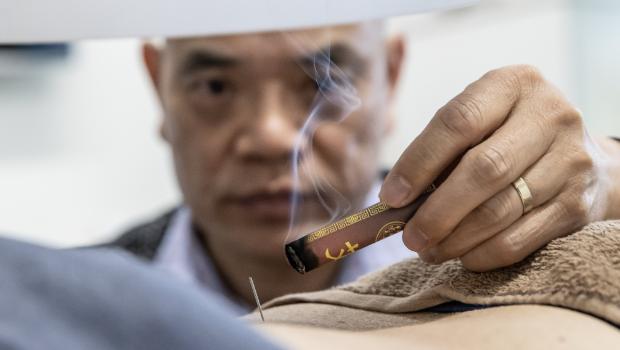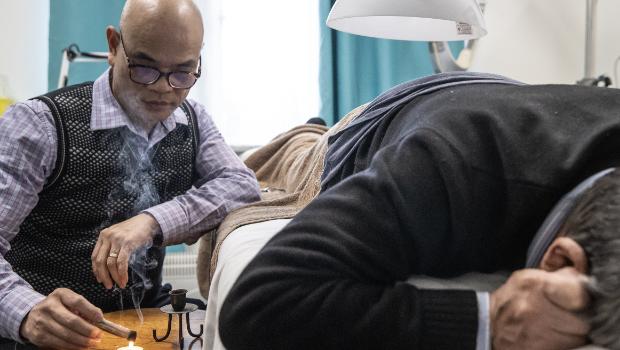
 i_need_contribute
i_need_contribute

Thomas Lin has been practising Chinese medicine and acupuncture for 27 years in Christchurch.
IAIN MCGREGOR / THE PRESS
“It [the scent] is the burning moxa,” says Lin, who has been practising traditional Chinese medicine (TCM) and acupuncture in Christchurch for 27 years.
During an acupuncture treatment at his Upper Riccarton clinic, the burning moxa - a cone or stick made of ground mugwort leaves, on or near an acupuncture point - “would bring heat” and “improves the flow of qi (energy) in your body”.
The scent of moxibustion was “natural, relaxing and calming”, and “most clients fell asleep during the treatment”.

Lin lights a a moxa stick to hold on or near an acupuncture point on the patient’s back. “Acupuncture is less painful than it looks,” he says.
IAIN MCGREGOR / THE PRESS
Beloved by his clients, the 56-year-old TCM practitioner, who graduated from Guangzhou Medical University in 1991, said spreading the practice out of China had remained a challenge.
There were only two or three TCM practitioners in Christchurch when he opened his clinic in 1996.
“Now there are over 80. Among those, about 20 are Pākehā.”
It was not unusual for Kiwis to think of TCM as “a bunch of hocus pocus”, he said, but the Chinese had been doing it for thousands of years with great success.
“Whether it is TCM or western medicine, it always comes down to proving that the drugs, technology and methodology are effective and safe, and they help patients out of pain.”
A TCM practitioner is usually called dai fu in Mandarin, which directly translates as ‘treatment master’.
One of the basic principles of the millennia-old medical custom is qi -- the body’s vital energy, which circulates through channels in the body and connects to various organs and functions.
TCM therapies - including cupping, tui na, acupuncture, herbal drugs and dietary guidelines - seek to activate those channels and balance someone’s qi.
“Through TCM therapies, we let qi flow in a balanced way,” Lin said.
“For those who did not believe it worked, I just invited them to try it, then judge for themselves.”
About 600 types of herbs are kept in labelled wooden drawers and jars at Lin’s clinic.
“Some herbs can be found in New Zealand. But we got all of our herbs from China. They have farms specially for these herbs.”
Since late July, all TCM practitioners have been required to register at the Chinese Medicine Council under the Ministry of Health.
“This is monumental for our profession. This is a very big step for us,” Chinese Medicine Council chairperson Paddy McBride said.
She said TCM professionals had worked for over 20 years, “trying to gain recognition of TCM in New Zealand”.
The Health Practitioners Competence Assurance (HPCA) Act came in in 2003, but Chinese medicine was not included, she said.
“So we’ve been working since then to get the same recognition for Chinese medicine as for the other health professions.”
More than 25 different health professions were now regulated under the HPCA Act, including nurses, dentists, midwives, chiropractors, osteopaths, and podiatrists.
Demand for TCM treatments was continuing to grow alongside the number of providers throughout Aotearoa.
More than 329,000 sessions were delivered by acupuncturists in the year to June, according to figures from ACC. In 2020, more than 692,000 sessions were delivered.
ACC had funded treatment from traditional Chinese medicine-trained acupuncturists since 1996, ACC’s acting head of health partnerships, Stafford Thompson, said.
“This mainly includes acupuncture and, where clinically indicated, may include supplementary treatments, including moxibustion, acupressure and tui na, for an ACC covered injury.”
As of July 31, 1014 acupuncturists were registered as treatment providers with ACC.
Christchurch resident Janet Riley said getting into Lin’s clinic years ago was “one of the best choices” she had made.
“I had a fall and a corked shoulder. I had some massage and tui na sessions at Lin’s. They worked really well,” the 75-year-old said.
Riley said taking Chinese herbs was “an easy yes” for her, and she had recommended Lin to many of her friends.
“But don’t ask me what herbs I took in. I could not tell or remember. They were very bitter.”
Herbal prescriptions were not covered by ACC.